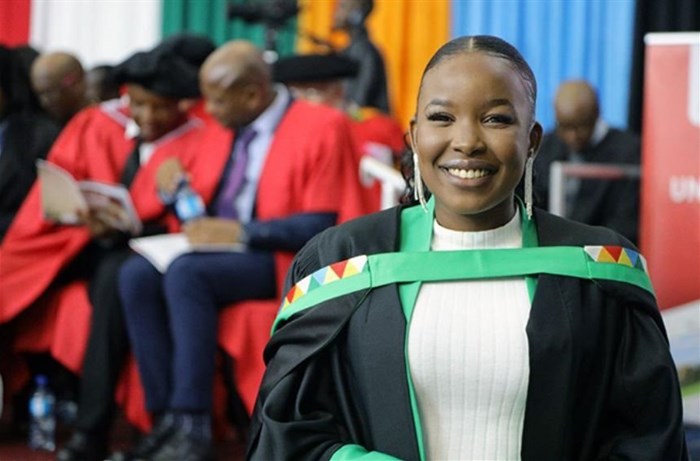Aspiring academic Anita Masenyama has graduated with a master's degree cum laude after investigating with remote sensing the water-related ecosystem services provided by grasslands in communal rangelands in South Africa. Supervised by the South African Research Chair in Land-Use Planning Professor Onisimo Mutanga and supported by funding from the Water Research Commission (WRC), Masenyama used remote sensing - a cost-effective technique - to map the ecosystem services provided by this vegetation type and estimate the benefits provided to communities in terms of water.

Source:
UKZN | Anita Masenyama
"I realised that there have been a lot of studies on the application of remote sensing in mapping ecosystem services provided by wetlands or vegetation structures such as forests but when it comes to grasslands, ecosystem services are undervalued," she says.
"I wanted to do something to show people that grasslands provide a lot of ecosystem services, not simply forage, which is why I focused on water-related ecosystem services," says Masenyama.
Masenyama chose communal rangelands because research shows that these constitute about 13% of South Africa’s agricultural land and sustain the livelihoods of about 13 million people in the country but suffer from a lack of collective sustainable utilisation and are often degraded as a result.
In her literature review, Masenyama identified a gap in remote sensing water-related ecosystem services in grasslands and set out to contribute what she could. "When you talk about water-related ecosystem services, grasslands can provide water regulation, water supply, water retention, water infiltration and more."
She worked with communities in Vulindlela in KwaZulu-Natal, with assistance in areas of communication, translation, and the facilitation of visits, and visited research participants to provide feedback on her research, with more reporting sessions planned with indunas in the area.
Mapping water-related ecosystems
An international student from Zimbabwe, Anita Masenyama, has achieved academic success at the University of KwaZulu-Natal (UKZN), graduating cum laude with a Master's degree in Environmental Science. Her research focused on mapping the water-related ecosystem services provided by grasslands in communal rangelands in South Africa using remote sensing technology, which was supported by funding from the Water Research Commission (WRC) and supervised by the South African Research Chair in Land-Use Planning, Professor Onisimo Mutanga.
Masenyama's academic journey began in 2017 when she enrolled for an undergraduate degree in Social Sciences at UKZN. She then completed her Bachelor of Social Science Honours degree in Geography and Environmental Management, achieving a distinction for her project on mapping invasive species in Pietermaritzburg’s Ferncliffe Nature Reserve. Inspired by her success, Masenyama pursued a Master's degree in Environmental Science and discovered her strengths in academia, research, and teaching, with a plan to pursue a career in academia.
Throughout her studies, Masenyama was active in university activities, serving as a supplemental instruction leader and demonstrator, and also as vice-chair of the International Association for Impact Assessment South Africa, KwaZulu-Natal Student Branch. She credits her success to her supervisor and co-supervisors, as well as the support of her family and funding from the WRC.
Masenyama plans to continue her research on grasslands in her PhD studies to contribute to filling gaps in this field.













































